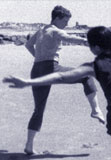Panel discussions with local scientists, conservationists and artists follow most of the performances. The audience has the opportunity to discuss issues of migration, navigation and conservation on both a local and global level. BIRD BRAIN works with local partners to identify panelists in the community that are interested in exploring and discussing these issues.
Tour 2 panelists included:
June Ficker, Wells Reserve, ME
Karen McElmurry, Managing Director, Center for Wildlife, ME
Don Hudson, President, The Chewonki Foundation, ME
Sue Haley, Supervisor, Salt Pond Visitor Center, MA
Peter Mott, NYC Audubon, NY
Rebekah Creshkoff, Author, NYC
Cathy Drew, The River Project, NY
Mitschka Hartley, PhD, Forest Ecologist, Cornell Laboratory of Ornithology, NY
Tedor Whitman, The Wetlands Institute, NJ
Peter Murphy, Author, NJ
Ulla dalum Berg, PhD Candidate, NYU Anthropology, NY
Jack Connor, Professor of Writing, Richard Stockton College of New Jersey, NJ
Scott Weidensaul, Author, PA
Wendy Hill, PhD, Professor and Chair of Neuroscience, Dept. of Psychology, Lafayette College, PA
Wendy Stanton, Wildlife Biologist, Pocosin Lakes NWR, NC
Feather Phillips, Director, Pocosin Arts, NC
William R. Stott III, Research Professor; Director, Albemarle Ecological Field Site, The Carolina Environmental Program, University of N.C., NC
Jan DeBlieu, Author, NC
Ernie Marshall, Bird Watcher, NC
Marimar McNaughton, Marketing Director, Pocosin Arts, NC
Whit McMillan, South Carolina Aquarium, SC
Ann Shahid, Education Director, Francis Beidler Forest Audubon Center and Sanctuary, SC
Brooke Vallaster, Sapelo Island NERRS, GA
Brian Mealey, Director of the Department of Environmental Science, Miami Museum of Science, FL
Frankie Aranzamendi, Bilingual Interpretive Park Ranger, Everglades National Park, FL
Alan Farago, Chairman of the Board, Everglades Defense Council, FL
Brenda Marshall, Director, Trust for Public Land, FL
Jane Gilbert, Executive Director, Arts for Learning/Miami, FL
Janet McAliley, Miami River Commission, FL
Captain Beau Payne, Miami River Marine Group, FL
Mario Gonzalez, Director, Programa Sibarimar, Cuba
Alina Gonzalez, Education Director, Programa Sibarimar, Cuba
Rogelio Diaz-Fernandez, Investigator/Researcher. Population Genetics, Universidad de la Habana, Centro de Investigaciones Marinas, Cuba
Jordana Ayala, Coordinadora de Educacion Ambiental, Fundacion Tierra Viva, Venezuela
Xiomara Bastardo, Coordinadora de Educacion Ambiental, Fundacion Tierra Viva, Venezuela
Ernesto Fernandez Badillo, President, Henri Pittier National Park, Venezuela
Tour 1 panelists included:
Wayne Perryman, gray whale researcher, Southwest Fisheries Science Center, NMFS, NOAA
Jim Sumich, gray whale researcher, Grossmont College
Claude Edwards, bird expert
George Herring, Interpretive Ranger, Cabrillo National Monument
Jennifer Price, author of
Flight Maps-Adventures with Nature in Modern America
Jess Morton, poet and bird enthusiast
Doreen Moser, Marine Mammal Center
Paul Long, Gulf of the Farallones National Marine Sanctuary
Josiah Clark, bird expert
Rouvaishayana, Interpretive Ranger, Mackerricher State Park
Michael Pinny, Crescent City Earth Day organizer
Katherine Fuller, Ranger, Redwood National Park
Mike Rivers, Park Interpreter, Oregon Parks and Recreation Department
Wayne Hoffman, Coordinator of the Midcoast Watershed Council
Elaine McCracken, Youth Volunteer Coordinator at the Oregon Coast Aquarium
Range Bayer, has authored several papers and websites on salmon, bird and dragonfly migration
William Fox, author of
The Void, the Grid and the Sign
Erin Boberg, Assistant Curator of Performance at PICA
Libby Palmer, gray whale scientist
Heather Harding, contract whale biologist
Tracking the animals and it's influence on the dance performances:
At the start of the tour, the artists convene with scientists and
identify an animal with a satellite transmitter or other tracking device. Tracking the progress
of the animal throughout the tour will dictate elements of the live
performances. For example, the animal might be traveling through bad
weather or over the ocean, mountains or cities or taking a stop over for
a while or blown off course - all these possibilities will directly
affect the structure of the scores that we use the day of each performance.
Scientists will also participate in panel discussions following BIRD
BRAIN performances.
To follow the ospreys in Tour 2 go to
www.raptor.cvm.umn.edu


